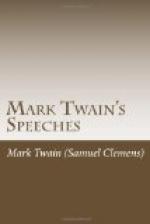I have been on the continent of Europe for two and a half years. I have met many Americans there, some sojourning for a short time only, others making protracted stays, and it has been very gratifying to me to find that nearly all preserved their Americanism. I have found they all like to see the Flag fly, and that their hearts rise when they see the Stars and Stripes. I met only one lady who had forgotten the land of her birth and glorified monarchical institutions.
I think it is a great thing to say that in two and a half years I met only one person who had fallen a victim to the shams—I think we may call them shams—of nobilities and of heredities. She was entirely lost in them. After I had listened to her for a long time, I said to her: “At least you must admit that we have one merit. We are not like the Chinese, who refuse to allow their citizens who are tired of the country to leave it. Thank God, we don’t!”
COPYRIGHT
With Mr. Howells, Edward Everett Hale, Thomas Nelson Page, and a number of other authors, Mr. Clemens appeared before the committee December 6, 1906. The new Copyright Bill contemplated an author’s copyright for the term of his life and for fifty years thereafter, applying also for the benefit of artists, musicians, and others, but the authors did most of the talking. F. D. Millet made a speech for the artists, and John Philip Sousa for the musicians.
Mr. Clemens was the last speaker of the day, and its chief feature. He made a speech, the serious parts of which created a strong impression, and the humorous parts set the Senators and Representatives in roars of laughter.
I have read this bill. At least I have read such portions as I could understand. Nobody but a practised legislator can read the bill and thoroughly understand it, and I am not a practised legislator.
I am interested particularly and especially in the part of the bill which concerns my trade. I like that extension of copyright life to the author’s life and fifty years afterward. I think that would satisfy any reasonable author, because it would take care of his children. Let the grandchildren take care of themselves. That would take care of my daughters, and after that I am not particular. I shall then have long been out of this struggle, independent of it, indifferent to it.
It isn’t objectionable to me that all the trades and professions in the United States are protected by the bill. I like that. They are all important and worthy, and if we can take care of them under the Copyright law I should like to see it done. I should like to see oyster culture added, and anything else.
I am aware that copyright must have a limit, because that is required by the Constitution of the United States, which sets aside the earlier Constitution, which we call the decalogue. The decalogue says you shall not take away from any man his profit. I don’t like to be obliged to use the harsh term. What the decalogue really says is, “Thou shaft not steal,” but I am trying to use more polite language.




